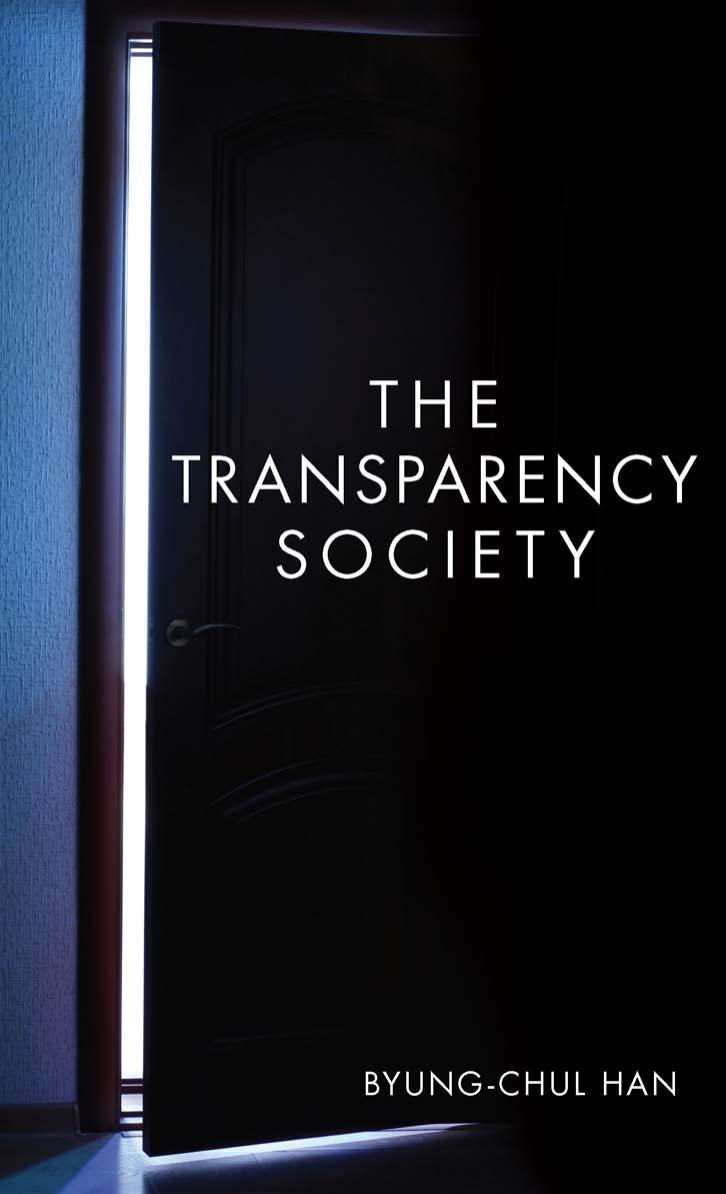The Transparency Society by Byung-Chul Han

Author:Byung-Chul Han [Han, Byung-Chul]
Language: eng
Format: epub, pdf
Publisher: Stanford University Press
Published: 2015-08-19T07:00:00+00:00
THE SOCIETY OF ACCELERATION
According to Sartre, the body becomes obscene when it is reduced to the mere facticity of the flesh. A body without reference is obsceneâwhen it has no direction and does not perform an action or inhabit a situation. Supernumerary and surplus bodily movements are obscene. Sartreâs theory of obscenity also applies to the social body, its processes and movements. They become obscene when they are stripped of narrativity, direction, and sense. Then their surplus and excessiveness find expression in obesity, de-individualization, and rank growth. They teem and proliferate without aim or form. Therein lies their obscenity. Hyperactivity, hyperpro-duction, and hypercommunication are obscene; they accelerate beyond purpose. Such hyperacceleration is obscene; it no longer really moves [bewegen] anything or anywhere, and it does not really bring anything about [zuwege]. In its excessiveness, it spills out over its goal [Wohin]. This pure movement is obscene; it accelerates just for its own sake: âMovement does not disappear as much into immobility as into speed and accelerationâinto the more mobile than movement, so to speak, which pushes it to the limit while stripping it of sense.â1
Addition is more transparent than narration. Only a process that is additive and not narrative admits acceleration. Only the operation of a processor is wholly transparent, because it proceeds solely through addition. Rituals and ceremonies, in contrast, are narrative processes; they elude acceleration. It would be sacrilegious to seek to accelerate a sacrificial act. Rituals and ceremonies have their own temporality, their own rhythm and tact. The society of transparency abolishes all rituals and ceremonies because they do not admit operationalization; that is, they impede the accelerated circulation of information, communication, and production.
In contrast to calculation, thinking is not self-transparent. Thinking does not follow precalculated paths, but betakes itself into the open. According to Hegel, negativity inhabits thinking, which causes it to experience what transforms it. The negativity of becoming-different-from-oneself proves constitutive of thinking. Herein lies its difference from calculating, which always remains self-identical. Such likeness provides the condition of possibility for acceleration. Negativity distinguishes not only experience, but also knowledge [Erkenntnis]. A single insight can put all that exists, everything as an entirety, into question and change it. Information lacks such negativity. Likewise, experience [Erfahrung] holds consequences that exude transformative power. In this respect, it differs from experiencing [Erlebnis], which leaves what exists as it stands.
The absence of narrativity distinguishes the processor from the procession, which is a narrative event. Unlike a processor, a procession has a strong sense of direction. For this reason, it is anything but obscene. Both âprocessorâ and âprocessionâ derive from the Latin verb procedere, which means âto step forward.â The procession is harnessed by narration, which lends it tension. Processions stage special passages of a narration scenically. Scenography marks them. Because of their narrativity, a particular temporality inhabits them. Therefore it is neither possible nor meaningful to accelerate their procedere. Narration is not addition at all. The procedere of the processor, on the other hand, lacks all narrativity. Its activity has no image, no scenes.
Download
This site does not store any files on its server. We only index and link to content provided by other sites. Please contact the content providers to delete copyright contents if any and email us, we'll remove relevant links or contents immediately.
Zero to IPO: Over $1 Trillion of Actionable Advice from the World's Most Successful Entrepreneurs by Frederic Kerrest(4569)
Machine Learning at Scale with H2O by Gregory Keys | David Whiting(4313)
Never by Ken Follett(3957)
Harry Potter and the Goblet Of Fire by J.K. Rowling(3857)
Ogilvy on Advertising by David Ogilvy(3622)
Shadow of Night by Deborah Harkness(3368)
The Man Who Died Twice by Richard Osman(3079)
Book of Life by Deborah Harkness(2939)
The Tipping Point by Malcolm Gladwell(2922)
Will by Will Smith(2920)
Purple Hibiscus by Chimamanda Ngozi Adichie(2853)
0041152001443424520 .pdf by Unknown(2845)
My Brilliant Friend by Elena Ferrante(2831)
How Proust Can Change Your Life by Alain De Botton(2814)
How to Pay Zero Taxes, 2018 by Jeff A. Schnepper(2655)
Hooked: A Dark, Contemporary Romance (Never After Series) by Emily McIntire(2554)
Rationality by Steven Pinker(2364)
Can't Hurt Me: Master Your Mind and Defy the Odds - Clean Edition by David Goggins(2341)
Borders by unknow(2315)
